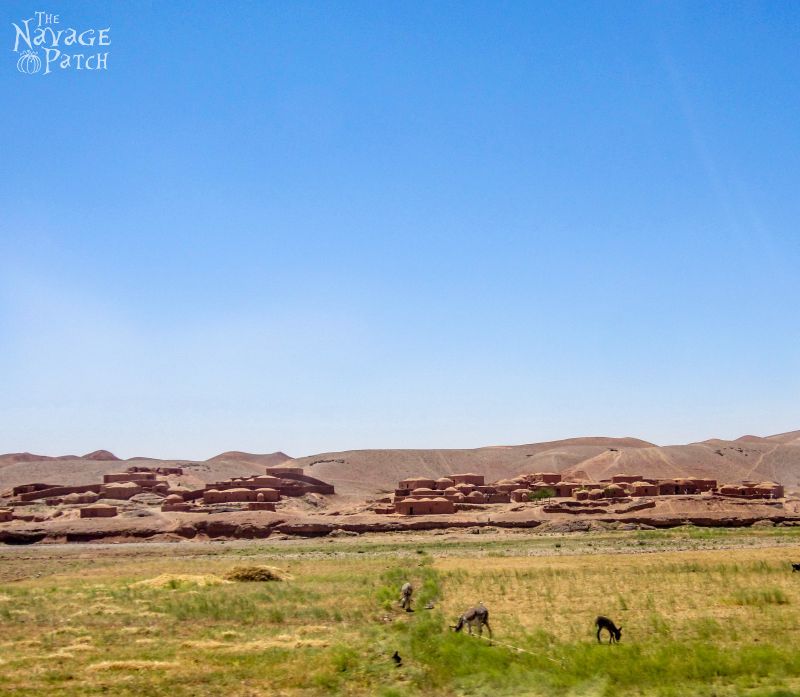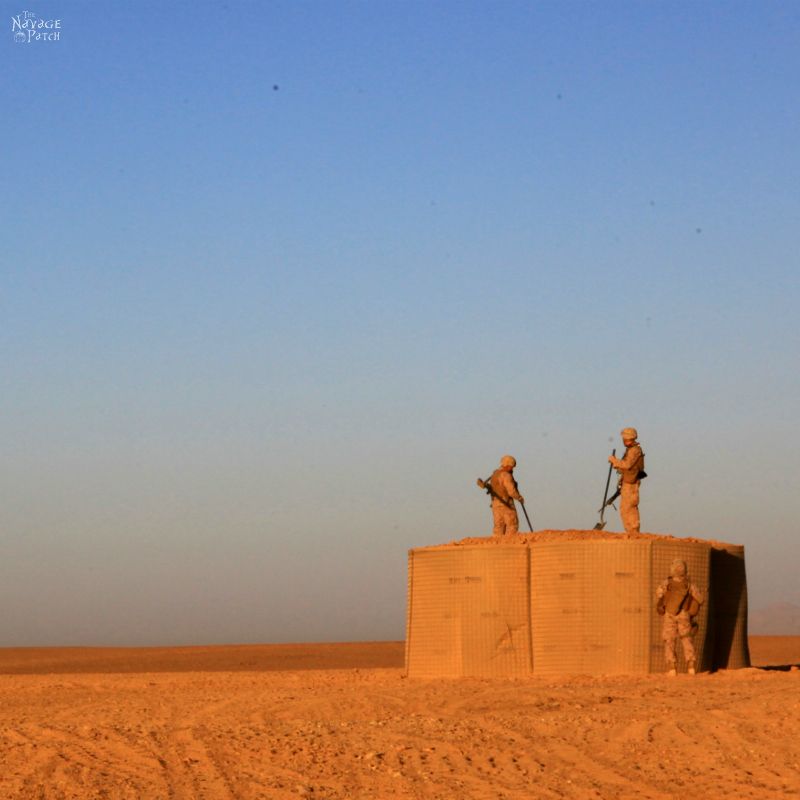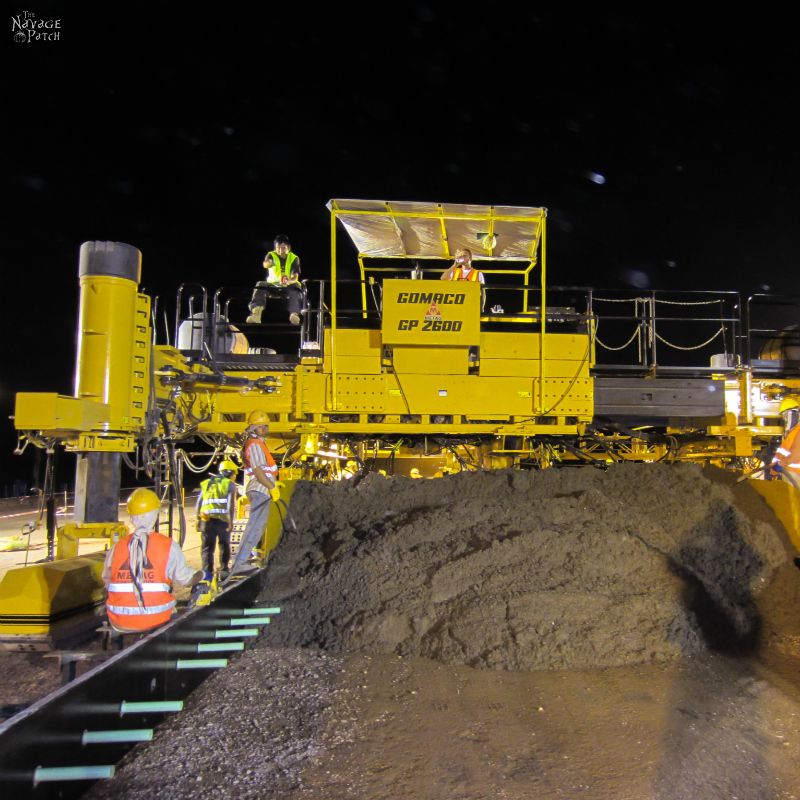Afghanistan – Part 6: The Road to Shindand
CONTINUED FROM>> About Us >>
We had arrived at our company’s headquarters in Kabul at dawn, safe but tired. We would stay there for that day and night, then head back to the airport early the next morning for a flight to Herat. In order to fly from Kabul to Herat on a commercial airliner, we would need visa stamps on our passports. Before we left Camp Bastion, we had each given our passports to one of the Turks from HQ so he could get them stamped in Kabul. Try to imagine the emotions I kept in check while handing over my US Passport to an unknown Turk in the middle of Afghanistan. My mind screamed and howled in protest as I held out my hand and proffered that little blue Booklet of Freedom. But what choice did I have? We needed to get to Forward Operating Base Shindand, and the only way to do that was by way of a commercial flight and a terrifying gut-wrenching heart-stopping pleasant drive through the countryside. A week after parting ways with our passports, we received them back by courier when a new hire showed up at our work camp. All was well, and we were go for travel.
Since we had a night to let loose in Kabul, we decided to take in some sights around town and buy some illegal hooch. We didn’t buy it ourselves, rather we gave $100 to our driver to make the transaction for us. We went into a mall and stopped into a store that had a selection of sodas and candy and cigarettes. Our driver engaged in some small talk with the proprietor who then went into the back room and emerged moments later with a plastic shopping bag, bulging at the bottom. He added some sodas, and we were on our way. Back at our company’s HQ, I got to have a rare drink of vodka. Notice the bottle says Stolichnaya. The contents were anything but. But booze in Afghanistan is like an oasis in the desert: you don’t question it – you drink it and enjoy it.

The next morning, we said our goodbyes to my father-in-law and headed to Kabul International Airport. Our company HQ was sited at one end of the runway, a literal stone’s throw away. But the airport entrance was a 20 minute drive. Kabul International Airport has some of the tightest security of any airport in the world. It has to, given the bloodlust of the Taliban and Al-Qaida. On approaching the airport, all vehicles were diverted off of the main access road. Passengers and their luggage then exited their vehicles and made their way to one of two lines for screening: one for men and one for women. While the passengers lined up, the vehicle and driver were searched for bombs. Once the passengers got through the baggage and body screening building, they reunited with their drivers, who then re-entered the access road and drove to the parking area. Mindful of the possibility that a bomb might have avoided detection, all areas in front of and near the airport were closed to vehicular traffic. The parking areas were far away, and either required a shuttle bus or a long walk. On entering the airport, passengers were once again shunted into gender-specific lines for a final search of their baggage and their person.
We were flying Kam Air, one of two (that I know of) regional carriers in Afghanistan. Handan and I walked to our gate. It was packed full of Afghans. Two hundred eyeballs rotated in our direction and locked on us like laser-guided missiles. Apparently we didn’t blend so well.
Most (likely all) western contractors who worked in Afghanistan worked for American companies. They flew in and out of military bases on military or private charters. On the rare occasions they needed to travel “outside the wire,” they did so in military convoys with full body armor. Handan and I worked for a Turkish/American joint venture, but we were provided for by Handan’s father, who was the country manager for the Turkish part of the joint venture company. This was the Turks’ neck of the woods, so no such precautions were taken. We flew commercial and when we drove…well you’ll hear about that in just a little bit. Suffice it to say, I was the only gringo in the joint. All those searing eyeballs made an already-stifling departure lounge even hotter. I longed for the plane to arrive, but discovered that regional commercial flights have a 0% on time rating in Afghanistan. I stood with Handan while sweat soaked my clothing.
The plane arrived at the gate about 30 minutes after we were supposed to have left. The passengers deplaned and we were allowed to board. I sat with Handan, holding her hand and thinking of all the bad things that could happen to this Kam Air flight. Who the hell were these people anyway? Kam Air? Never heard of it! When was this plane built? Kennedy-era Cold War? Who trained the pilots? Who were the pilots? What if they were Taliban…
A voice cut through my thoughts. Someone yammering over the PA in Dari or Pashtun. I knew it! He was taking us hostage!
Then another voice.
“Hello ladies and gentlemen, this is the captain speaking. Welcome to Kam Air flight 931 to Herat. Our flying time will be approximately one hour. The weather in Herat is sunny and 27 degrees. We hope you enjoy your flight.”
The captain was….American? There’s no faking that accent. What the hell was an American doing piloting a regional puddle-jumper in war-time Afghanistan? Whatever. Relief washed over me, and I relaxed into my seat.
We took off and left Kabul behind.

The flight was perfect and uneventful, and we landed in Herat an hour later. Herat is the third largest city in Afghanistan, 400 miles due west of Kabul and about 80 miles east of the Iranian border. Ours was the only plane at Herat Airport. We descended the airstairs and stepped onto the apron. We all walked towards a chain-link fence where people were waiting to greet the passengers. We were met there by two Afghans and a Turk named Naci (pronounced NAH-jee). Our company had a small office/bunkhouse in Herat. It was a walled villa run by Naci and staffed with a few Turkish-speaking Afghans. Its primary function was to coordinate the purchase of certain goods needed by the staff working in Shindand. It also served as a rest stop and layover point for those traveling between Kabul and Shindand. We didn’t visit the villa on this trip, as we were needed in Shindand as soon as possible. Besides, even though it was mid-morning, we didn’t want to take the chance of getting caught on the road to Shindand after dark. That would be suicide.
There were two cars waiting for us, both dilapidated Toyota Corollas from the late 80s/early 90s. Handan and I would ride in one. The other was delivering some items that the Shindand staff had requested. We climbed into the white Corolla with Abdullah, one of the Afghan drivers. The other Afghan took the wheel of the red one. Naci stayed behind.
Abdullah turned to Handan. “Miss Handan, please wear this on your head.” He handed her a scarf. “You need to cover your head or we have trouble.”
He turned to me. “Mister Greg, please wear these. You need to cover your eyes.” My eyes are blue. They don’t blend. He handed me his sunglasses – a cheap plastic pair, but likely dear to him.
“Thank you, Abdullah. I have my own. I’ll wear them, okay?” He nodded and put his sunglasses back on. I wondered what the road to Shindand had in store for us.
I took a last look at the airport.

Then we lit out for Shindand, a mini convoy of two unarmored Toyotas, with our car in the lead. I sat in the front passenger seat, and Handan sat in back. As we approached the outskirts of town, I noticed a curious thing lining the sides of the road.

Trees! Besides a few haggard-looking specimens in Kabul, These were the first real trees I’d seen in Afghanistan. I was liking this new part of the country.
The road from Herat to Shindand was an 80 mile shot due south. It could take anywhere from one to two hours, depending on the speed the driver was capable of handling, checkpoint stop times, unauthorized checkpoints, and road conditions (bomb damage, etc). The rules of this particular road were simple: drive as fast as car and driver would allow, stop only when necessary for military checkpoints and never ever drive at night.
Abdullah mashed the gas pedal and accelerated the rolling rust-bucket to 100 mph. There is nothing more terrifying than hurtling down an ill-kept, slightly hilly and windy Afghan highway in a decades-old heap of plastic, steel and bolts. The cabin was filled with gasoline fumes, likely from a leaking fuel line. The shocks were shot, so it seemed like my butt was dragging on the ground. This made the 100 mph speed seem more like 200 mph. I put on a phony calm demeanor and squeezed a handprint into the plastic door handle. I looked back at Handan, and she smiled at me. Was she actually calm, or was she bullshitting just like me? I turned forward as we pulled up to our first military checkpoint. Our driver rolled down his window, and an Afghan soldier looked in at us. Words were exchanged in Dari between the soldier and Abdullah. He rolled up his window, and accelerated back up to cruising speed.
We drove through beautiful Afghan countryside and passed a few picturesque villages.



This was tribal land, remote and removed from the politics of Kabul. Here the homes were all made of mud. The naive me of 5 years ago would have loved to stop in one of those villages to speak to the people and get their perspective on everything that was happening in their country. The wiser me of today knows that such a foolish attempt very likely would have ended in tragedy.
After a time, we saw two men armed with AK-47s standing in the road ahead of us. They waved at us to stop. Abdullah began to slow down and pull to the shoulder.
“Who are they,” I asked. I didn’t like the look of them.
“I don’t know. Maybe bank guards.”
Bank guards? What the flipping flip would bank guards be doing in the middle of nowhere on a remote stretch of highway with AK-47s slung around their necks?? What the hell were they guarding?
I had a bad feeling about those “bank guards,” but I trusted Abdullah not to lead us into an ambush.
Abdullah continued to slow and pulled over to the shoulder. The armed men stepped to the side of the road to give us room. I rolled down my window. We pulled up to the men, almost fully stopped. They held their rifles at the ready and approached my window.
From behind, we heard a car lay on its horn. The second driver sped past us, one hand on the horn, the other waving frantically for us to GO GO GO! His face was panicked. Abdullah looked back at the armed men, then slammed his foot on the gas pedal, as I rolled up the window and flinched away from it. I yelled at Handan to get down, expecting gunshots to shatter the rear window, but the men just stood in the road and watched us go. We never learned who those “bank guards” really were or why they were there. Handan and I drove that road another six times and never saw anyone like them again.
After our run-in with the AK-toting highwaymen, the only danger and fear for the rest of the journey came from Abdullah and his “skill” at piloting that museum piece we rode in. In addition to speeds unsuited to both car and road, Abdullah (in fact all drivers) drove in the middle of the road. Yep, two lanes, but they all drove smack dab in the middle, unless of course there were two cars traveling in opposite directions, in which case they moved to their respective lanes until the road was again clear, whereupon they moved back to the middle. This made a lot of sense considering how many people had died from IEDs (Improvised Explosive Devices) planted on the sides of the roads. But here’s the thing: they would go around corners and over blind hills at speeds approaching 100 MPH driving in the middle of the road! At every turn and over the crest of every hill my heart stopped. What if another car was doing exactly what we were doing, but going the other way? Ugh, I longed for that time we only had to deal with crazed rifle-toting bank guards!
Eventually and obviously, we made it to Forward Operating Base Shindand. It was perhaps the most relief I’d ever felt at a journey’s end. We approached the base’s one and only gate and got into a long line of trucks and cars waiting to be inspected. We got out of the car to stretch our legs. Since this gate almost always had a line of vehicles awaiting their turn for inspection and entry, an ecosystem of vendors had grown there, selling water and soda and candy to the waiting drivers. As I strolled around, a small Afghan boy approached me. He was filthy, dressed in rags. His teeth were stained brown. He would have been a good-looking and likely well-adjusted kid in any other country, but here he was a beggar. He ran to me, saying “Mister Dollar, Mister Dollar,” over and over. I thought that Mr. Dollar was a pretty cool name. I liked it. Then I thought maybe he was really saying, “Mister, dollar. Mister, dollar.”
“Okay, kid. Here ya go.” I fished a bill from my pocket and gave it to the dusty scamp. He flashed a big brown-toothed smile and ran away.
After about an hour, we finally made it through inspection. We went through some formalities with the soldiers at the gate since we were new. A long-haired young Turk from our new camp showed up to meet us. His name was Serdar, and his job was to liaise with the soldiers at the gate and escort Turks and Afghans around the base. The soldiers knew him well. He spoke decent English and liked to joke with everyone he met. He especially liked chatting up the female soldiers. The soldiers got a kick out of him. Once we were cleared to enter the base, Serdar gave us a lift in one of the company SUVs. He loved Jimi Hendrix, so we listened to Purple Haze as we drove through the dusty streets to our new temporary quarters situated in the Afghan National Army’s section of the base.
We found our quarters, showered and had a meal at our camp’s canteen. As night fell on our first day in Forward Operating Base Shindand, I wondered what adventures yet lay ahead.

CONTINUE ON TO>>







greg, this story is awesome and i still say you should beef it up and get it published, it will be a best seller xx
Thank you, Chris! You know, it’s funny – every time I publish one of these Afghanistan stories, we lose a handful of subscribers to the blog. Every time. It used to get me down and make me not want to continue the story. But Handan convinced me to keep going, and your awesome comments inspire me, too. I guess those people who left were expecting a by-the-book craft blog. We’re definitely not that! 😀
Handan is a very wise woman. I have been captivated by these accounts of how you met, and you experience abroad. Don’t worry about subscribers…they’ll come once they connect to the human part. You are an intuitive writer. Keep it coming.
Thank you so much! As long as people are willing to read, I’ll keep writing! 🙂
I’m loving these stories! Don’t stop! I’ve been waiting for this installment and was very happy when it showed up in my email. Love your writing. I can picture everything in my mind. Keep em coming! 🙂
Thank you, Andi! There’s so much more to tell: another six months in Afghanistan, nine months in Vietnam, then six months in India!
I love your stories! If your readership drops when you post your wordly adventures it is because the small minded are doing what they do….meanwhile you are gaining a more educated international audience.
My mom was British and spent her formative years in Turkey, Venezuela and Peru. My grandfather was in textiles. Back then South America was the wild west.
I digress… keep on keeping on..very cool!
Plus I think your wife is very talented she is lucky to have a carpenter husband. Roll on enjoy!
Thank you, Cathleen! Encouraging words like yours keep me going! Where in Turkey did your mom live? Handan was born in Antalya and grew up in Izmir.
I will ask her soon. Mom is in Atlanta celebrating my nieces 4th child.
She is 87 years young I can’t keep up with her…I will let you know mom has great stories of Turkey..walking home from school…her sister bought sweets..mom bought a cone full of olives. I am my mother’s daughter give me olives any day of the week! LI’ve Handan’s clock!
My mind can’t fathom…what just happened?!?
I clicked on a post that you linked up to my party. (great command center upcycle!) When I find new blogs I love to check out their About pages. Your first two sentences on your About Us page already had me smiling, and I thought “Oh, I’ll have to comment that their numbered list was the best ‘pull in’ I’ve ever read”. Then I clicked that little link to Read More..
An hour has gone by and I have binge read every installment of your story to date. You are a great writer and have a wonderful way with words. Two installments in and I thought this needs to be a screenplay for a movie. I so hope you at least make it a book. It saddens me that you have lost some subscribers, but it is their loss. You gained one today and I cannot wait to read more!
Thank you so much, Mistie! Encouraging feedback like yours gives lift to my wings when I feel like I’m spiraling towards the ground. This blog started as a way for Handan and I to showcase our crafts and woodwork and diy etc, but it is starting to be a little more than that with the ongoing story. I enjoy writing it, but I really get into it when I know people out there are connecting with it. Again, thank you for your kind words, and thank you for joining our journey! -Greg
Please continue this story…it’s very interesting. I have heard a lot about the construction business in Afghanistan and it’s great to see the pictures and read a first-hand account. We’re an American family in a small city in Saudi Arabia, and my husband is one of the typical “engineers” you describe (I’m a teacher here.) We have some good friends from on our compound who worked construction contracts in Afghanistan years ago. I’m not sure how I found this blog, but it’s great!
Thank you, Tammy! There is much more to come with this story. My next post will get more into the actual job we did. My father in law (a Turk) worked in Mecca, Jeddah and Medina when my wife was a kid, so she spent many summers there. Thanks for reading and commenting!
Greg, this is a fantastic story! I can’t wait for the next installments. I came to your blog through the Chicken Chick Blog Hop and was riveted reading your and Handans journey! (Like Handan, my daughter is a civil engineer – she works in NYC)
Hi Deb, I’m happy you found us! There’s a lot more to the story, so stay tuned! Great career for your daughter – has she had the chance or does she have the desire to work overseas?
Hi Greg,
My daughter isn’t that adventurous! She does love her job as a project engineer with a (national) railroad in NYC. She has stories, but not quite as engaging as yours!
I can’t imagine not finishing reading your adventures! I am hooked! Life must seem so much more calm now, perhaps even I boring! You two are far more brave and adventurous than most! Well, back to reading!
It is calm now. I do miss Afghanistan every now and then…there was a Wild West freedom to life there, but there were also mortar attacks and bullets. Given the chance, I wouldn’t go back…not anymore!
Greg, what a story! I can’t stop reading! It’s everything, a whirlwind long distance romance, exciting adventure,… all of it. I stumbled onto your website looking for rollout shelves for my wife’s kitchen, and then found the pond, and never expected this wonderful story about your lives..
Keep writing!
Rich
Thank you so much, Rich! More coming soon!
Greetings, like some of those before me I’m not sure of my path here to your blog. I was cruising Pinterest when I fell in here. I usually don’t read about the bloggers cause they’re mostly the same. But, ya hooked me. Looks like I’m a little behind as most comments are 1-2 years old. None the less wanted you to know I bought my ticket & now I’m on your ride. It is now 4:05 a.m.E.S.T. & I have to break away to get some much needed sleep. I will be back…..your story is so facinating. I’m sure glad I found it. Can’t wait to read more! Still looking for that lebneh recipe. I checked your recipe file & didn’t see it there so perhaps it is yet to come. When I’m finished reading your wonderful stories I want to browse you diys, crafts, etc. Keep up the good work both of you are doing & keep writing!
Hi Paula and welcome to The Navage Patch! I’m so happy you found this story – it’s important to me, and I’ve enjoyed sharing it! I never did share that labneh recipe 🙁 But here’s the trick – it’s just salted yogurt that is strained until very thick 🙂 Eat it with crusty bread and good olive oil, and you’ll be in heaven!
I have laughed so hard reading your stories! Hysterically funny & what an amazing writer you are. Although I have things I need to get done, your humor & stories keep me captivated. I can’t stop reading. You definitely have a gift & should publish your stories.
I love your site, it has so much to offer……You & Handan are a very special couple & I love the way you have combined your love story, adventures & your DIY projects all in one place.
Thank you so much, Debbie – I’m so happy you found our little adventure story! One of these years, I guess I’ll need to bundle up everything in my head (before it leaks out) and get it into book form.